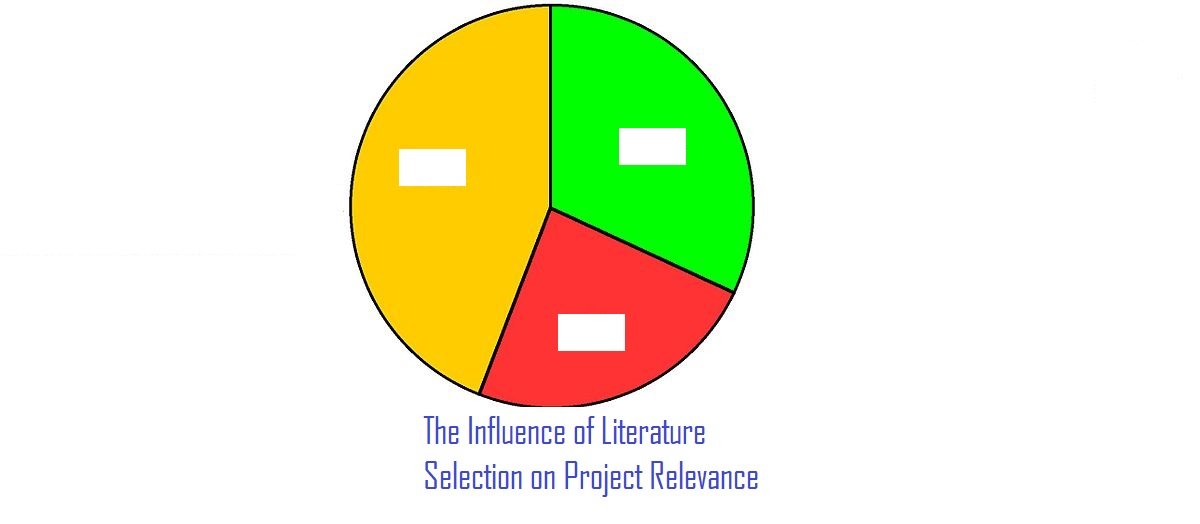- April 23, 2024
- Posted by: Igbaji Chinwendu
- Category: Project Writing Guide

The Influence of Literature Selection on Project Relevance
Contents
Introduction
Project relevance in academics refers to the significance and value of a study or research project with the body of current knowledge, practical applications, and societal influence. It is essential since it establishes its value to the field of study and any prospective applications in real-world settings.
That entails determining how the study fills in present knowledge gaps, provides fixes for issues that arise, or advances the field of study. The relevance of projects is determined by its capacity to tackle relevant problems in a certain field of study.
Proving the project’s relevance allows researchers to illustrate the significance of their work and its possible influence on the academic community, business community, or society at large. This guarantees that funds are given to initiatives that could advance their respective fields and make significant contributions.
Criteria for Assessing Literature Selection on Project Relevance
Several criteria are frequently applied when determining whether a research project is relevant in an academic setting. Criteria determining the project’s relevance consist of:
- Alignment with study Objectives: The degree to which the project aligns with the academic field’s study’s more general goals and objectives.
- Practical ramifications: The research findings have possible applications and ramifications in the real world for solving problems or expanding our current understanding.
- Contributions to Knowledge: The research’s originality and freshness and how it helps close theoretical or conceptual gaps in the field.
- Impact on Society: The study’s possible effects on governmental policy, business practices, and society.
- Interdisciplinary Connections: The project’s capacity to create links between various academic fields and advance interdisciplinary cooperation and comprehension.
- Timeliness: How well does the study topic address concerns that are currently being discussed or new trends that are appearing in the academic sector?

Constituent units necessary for achieving project relevance
Determining the project’s relevance is important, as a project’s ability to obtain financing, support from academic institutions, and attention from peers in the research community all depend on its ability to demonstrate its relevance. Furthermore, it guarantees that researchers are delving into pertinent issues and exploring paths that extend beyond abstract concepts. Furthermore, researchers on project relevance can effectively convey the importance of their work to various stakeholders, such as funding agencies, legislators, and industrial partners, by highlighting the relevance of their projects.
- Well-defined Project Objectives
Establishing well-defined project objectives is the primary factor in attaining project significance. These objectives must be time-bound, meaningful, quantifiable, achievable, and targeted (SMART). The project’s objectives must be clearly stated to all stakeholders and align with the organization’s overarching aims.
- Well-Defined Project Scope
Achieving project relevance requires a clearly defined project scope. This includes determining the project’s precise tasks, deliverables, and deadlines. The scope needs to be precisely stated and shared with all parties involved to prevent misunderstandings and confusion.
- Relevant and Applicable Knowledge and Abilities
The project team must possess the necessary knowledge and abilities to successfully complete the project, including technical proficiency, subject-matter knowledge, and soft skills like leadership, communication, and teamwork.
- Availability of Sufficient Resources
The project must have sufficient financial, human, and technological resources to accomplish its objectives. The resources should be distributed properly and efficiently to guarantee that the project is finished on schedule and within budget.
- Project Management Tools and Processes
Attaining project relevance requires the use of effective project management tools and processes. This covers scheduling, risk management, planning, and tracking the project’s advancement.
Stakeholder Involvement: Encouraging stakeholders is essential to making a project relevant. This entails locating the stakeholders, being aware of their requirements and expectations, and maintaining effective lines of communication with them throughout the project.
- Continuous Improvement
Reaching project relevance requires constant improvement. This entails keeping an eye on and evaluating the project’s advancement, determining areas that need modification, and putting those changes into practice to guarantee the successful completion of the project.
The selection process of literature influences project relevance
The choice of literature significantly impacts how relevant a project is. Finding, assessing, and incorporating current knowledge and information about the project’s subject matter are all steps in the book selection process. This has multiple effects on the project’s significance.
- Addressing Research Goals and Theories
The process of choosing literature influences a project’s research aims and hypotheses. By analysing the body of existing literature, researchers might spot areas that need more investigation, contradicting findings, or knowledge gaps. This helps in the development of research questions and hypotheses that are pertinent to the field’s current level of understanding.
- Offering Theoretical Structures About the Influence of Literature Selection on Project Relevance
The theoretical frameworks for the project’s conceptual underpinnings are found in the literature. Researchers can use well-established theories and concepts to direct their work by choosing pertinent literature. This guarantees that the initiative advances theoretical understanding in this field and is based on well-established expertise.
- Directing choices for methodology
The literature chosen for a project affects the methodological decisions taken. Studies that have already been conducted can teach researchers about the best ways to gather data, conduct in-depth interviews, and use analytical strategies specific to their subject. This guarantees that the project employs suitable approaches, augmenting its significance and legitimacy.
- Providing Evidence to Back Up Arguments
Researchers might use evidence from earlier studies to bolster their claims by carefully choosing their literature. By incorporating pertinent literature, researchers can add empirical support to their claims, interpretations, and findings. This raises the project’s findings’ legitimacy and applicability.
- Setting Results in Perspective
The literature selection process enables researchers to place their findings in the perspective of a larger body of knowledge. Researchers might illustrate how their findings support or contradict preexisting knowledge in the field by citing prior research. By emphasising the project’s relevance within the broader scholarly discourse, this contextualization increases the project’s relevance.
Conclusion
A project’s relevance and depth are greatly influenced by the literature it chooses. The literature has a complex influence on the applicability of a project, affecting the kind, approach, and general calibre of the study or project.
Researchers and project managers can make sure that their work is informed, current, and in line with the state of knowledge in their field by selecting relevant literature.
On the other hand, a lack of credibility, erroneous conclusions, and misdirected efforts might result from inadequate or inappropriate literature. Thus, obtaining significant and lasting results requires an awareness of how book selection affects project relevance.

